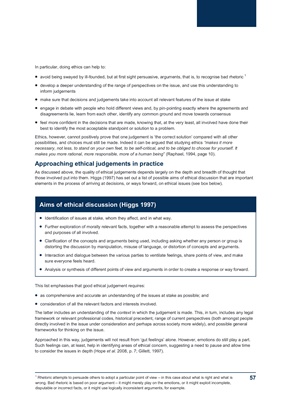
57
In particular, doing ethics can help to:
avoid being swayed by ill-founded, but at first sight persuasive, arguments, that is, to recognise bad rhetoric 1
develop a deeper understanding of the range of perspectives on the issue, and use this understanding to
inform judgements
make sure that decisions and judgements take into account all relevant features of the issue at stake
engage in debate with people who hold different views and, by pin-pointing exactly where the agreements and
disagreements lie, learn from each other, identify any common ground and move towards consensus
feel more confident in the decisions that are made, knowing that, at the very least, all involved have done their
best to identify the most acceptable standpoint or solution to a problem.
Ethics, however, cannot positively prove that one judgement is "the correct solution" compared with all other
possibilities, and choices must still be made. Indeed it can be argued that studying ethics "makes it more
necessary, not less, to stand on your own feet, to be self-critical, and to be obliged to choose for yourself. It
makes you more rational, more responsible, more of a human being" (Raphael, 1994, page 10).
Approaching ethical judgements in practice
As discussed above, the quality of ethical judgements depends largely on the depth and breadth of thought that
those involved put into them. Higgs (1997) has set out a list of possible aims of ethical discussion that are important
elements in the process of arriving at decisions, or ways forward, on ethical issues (see box below).
This list emphasises that good ethical judgement requires:
as comprehensive and accurate an understanding of the issues at stake as possible; and
consideration of all the relevant factors and interests involved.
The latter includes an understanding of the context in which the judgement is made. This, in turn, includes any legal
framework or relevant professional codes, historical precedent, range of current perspectives (both amongst people
directly involved in the issue under consideration and perhaps across society more widely), and possible general
frameworks for thinking on the issue.
Approached in this way, judgements will not result from "gut feelings" alone. However, emotions do still play a part.
Such feelings can, at least, help in identifying areas of ethical concern, suggesting a need to pause and allow time
to consider the issues in depth (Hope et al. 2008, p. 7; Gillett, 1997).
Aims of ethical discussion (Higgs 1997)
Identification of issues at stake, whom they affect, and in what way.
Further exploration of morally relevant facts, together with a reasonable attempt to assess the perspectives
and purposes of all involved.
Clarification of the concepts and arguments being used, including asking whether any person or group is
distorting the discussion by manipulation, misuse of language, or distortion of concepts and arguments.
Interaction and dialogue between the various parties to ventilate feelings, share points of view, and make
sure everyone feels heard.
Analysis or synthesis of different points of view and arguments in order to create a response or way forward.
1 Rhetoric attempts to persuade others to adopt a particular point of view - in this case about what is right and what is
wrong. Bad rhetoric is based on poor argument - it might merely play on the emotions, or it might exploit incomplete,
disputable or incorrect facts, or it might use logically inconsistent arguments, for example.